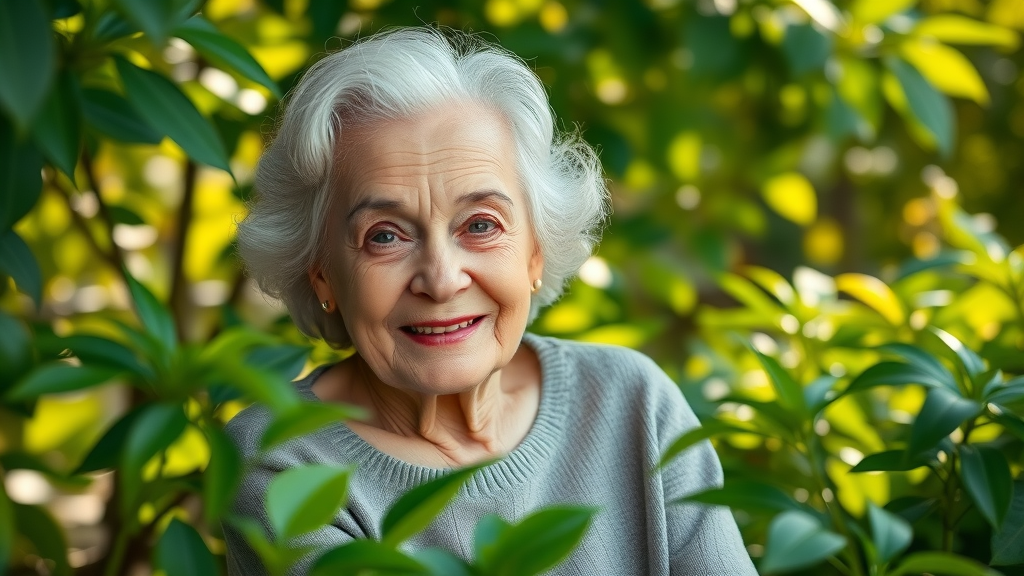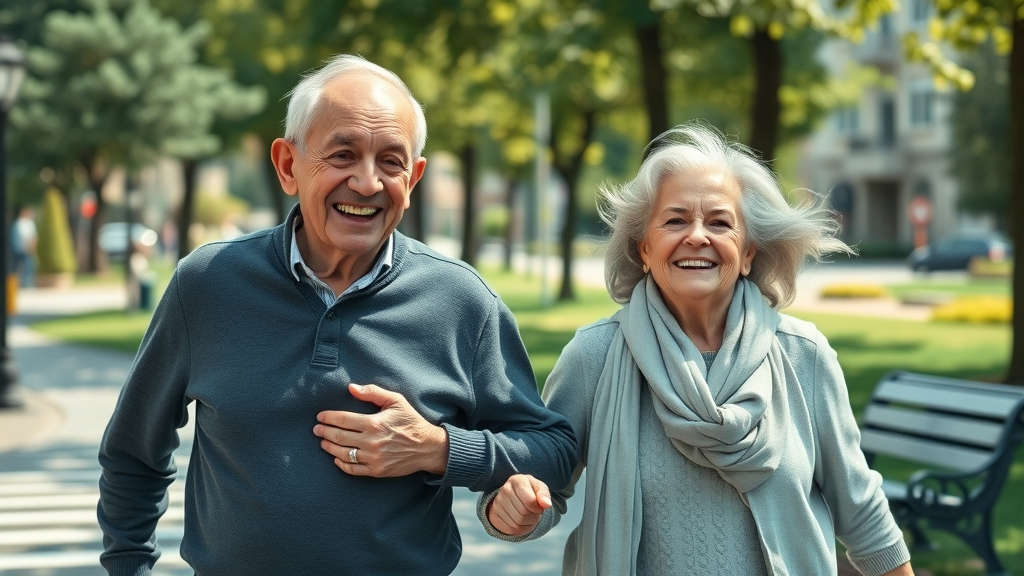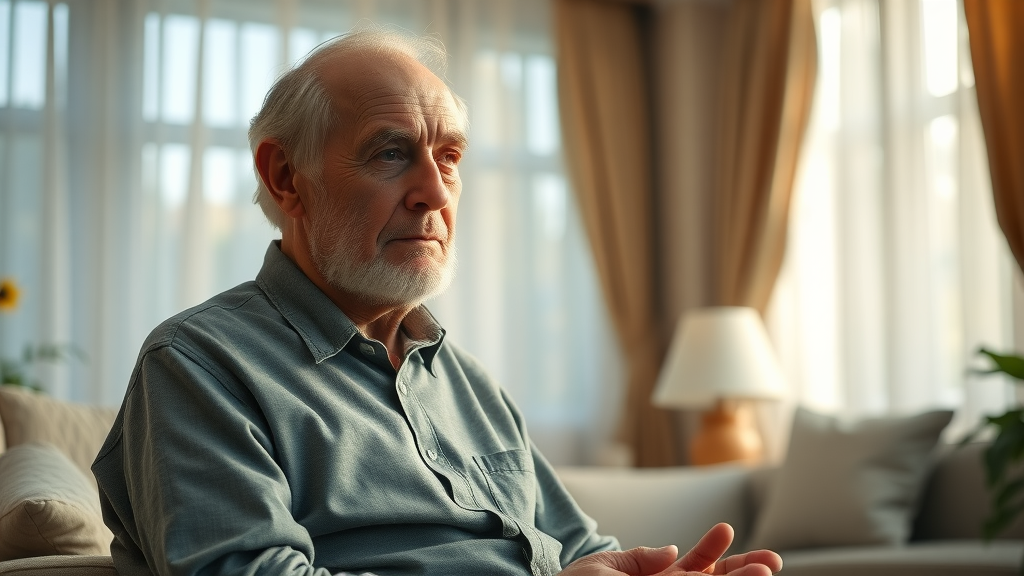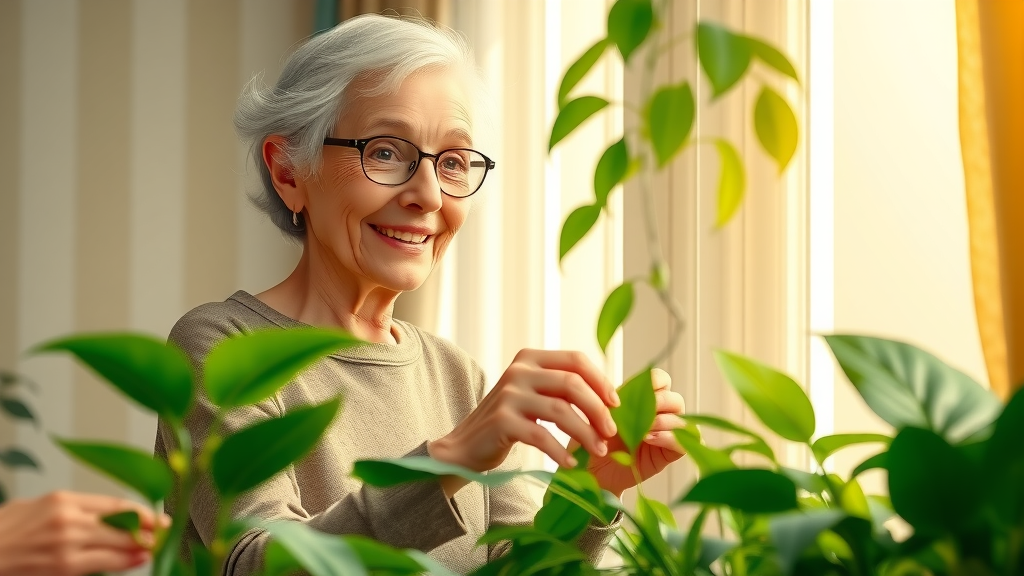Did you know that older adults who maintain strong social connections and adopt holistic wellness strategies are shown to live longer, healthier, and happier lives than their peers? Elder wellness isn’t just about avoiding illness—it’s about unlocking a vibrant, purpose-driven lifestyle at every age. Dive in to unlock actionable tips, innovative support services, and expert-backed guidance to transform your golden years.
- How elder wellness goes beyond basic health and why it matters
- The foundational pillars of elder wellness for every older adult
- Evidence-based benefits of wellness programs for seniors
- How to access and evaluate support services for elder wellness
- Step-by-step guidance to bring elder wellness into your home
Did You Know? Elder Wellness Reaches Far Beyond Physical Health
Most people believe elder wellness is simply about taking medication and attending medical checkups. However, the true scope of elder wellness is much broader, encompassing the emotional, mental, and social needs of older adults. A holistic approach recognizes that behavioral health, social connections, and cognitive function are just as vital as physical strength. In fact, studies show that strong social ties, engaging activities like a book club, and supportive communities can dramatically reduce stress and improve longevity for older adults.
Wellness for older adults also means integrating daily habits that foster joy, purpose, and resilience. Whether it's a morning neighborly phone call, becoming part of a thriving garden club, or simply practicing mindfulness, these activities support cognitive function and emotional well-being. Older adults who prioritize a balanced diet, routine exercise, and mental health have better outcomes in both physical and psychological health. It’s time to break the mold and view elder wellness as a multi-dimensional journey toward a thriving, fulfilling life.

Understanding the Intersection of Elder Wellness, Behavioral Health, and Mental Health
Elder wellness cannot be separated from the concepts of behavioral health and mental health . Behavioral health addresses daily habits and coping mechanisms, while mental health focuses on emotional regulation and resilience. Older adults often face transitions—retirement, the loss of a loved one, or changes in independence—that may challenge their well-being. Effective support means addressing anxiety or depression, supporting mindfulness practices, and forming routines that encourage meaning in daily life.
Integrating mental and behavioral health into elder wellness means encouraging activities that are enjoyable and social—such as a regular book club, artistic pursuits, or volunteer opportunities. Community case management and care coordination also play a role by connecting older adults with services, friends, and programs tailored to their unique needs. These efforts combine to nurture not just longevity, but quality and satisfaction in every season of life.
The Pillars of Elder Wellness for Every Older Adult
Physical Health: Movement, Nutrition, and Medical Care for Older Adults
Physical health forms the backbone of elder wellness. Regular movement, such as brisk walks, gentle stretching, or guided exercises, helps maintain flexibility, reduce risk of falls, and keep cardiovascular systems strong. Nutrition is equally important; a balanced diet rich in fruits, vegetables, protein, and fiber supports healthy aging and cognitive function. For some older adults, meal delivery services or community meal programs are crucial in ensuring dietary needs are met, especially for those facing mobility or transportation challenges.
Access to quality medical care rounds out physical wellness. From routine health screenings to personalized case management, older adults benefit from partnerships with healthcare providers who understand age-related changes. These professionals team up to create care plans that embrace preventive health, effective medication management, and timely medical interventions, shown to reduce stress and improve overall health outcomes.

Behavioral Health: Coping Mechanisms and Social Engagement
Behavioral health in elder wellness means more than managing chronic conditions—it’s rooted in developing healthy routines, strong coping mechanisms, and a robust support system. Participating in community activities, attending a favorite book club, or enjoying a daily phone call with friends are powerful actions proven to reduce stress and combat social isolation. Social connections are crucial for behavioral and mental health, giving older adults a sense of belonging and purpose.
Techniques like mindfulness practice and gratitude journaling can reduce the impact of negativity and promote emotional stability. Equally important are avenues for expressing concerns, whether through professional counseling, regular family updates, or community group sessions. Having access to behavioral health resources enables older adults to navigate challenges like anxiety or depression, ensuring they remain engaged and resilient in the face of change.
Mental Health Strategies Within Elder Wellness
Prioritizing mental health is a key part of comprehensive elder wellness. Research shows that older adults who pursue lifelong learning, challenge their minds through puzzles or creative hobbies, and seek social stimulation often enjoy sharper cognitive function and lower rates of dementia. Learning to manage stress with simple mindfulness techniques—such as breathing exercises, guided meditation, or gentle yoga—can also make a significant difference in emotional well-being.
Empowering older adults to access mental health support—whether through talk therapy, behavioral health consultations, or peer groups—allows them to develop strategies tailored to their own experiences. These services help older adults work through feelings of loneliness, anxiety, or grief, building resilience and helping them adapt to new life stages with strength.

Why Elder Wellness Programs Are Life-Changing for Older Adults
Evidence-Based Benefits of Elder Wellness Initiatives
Elder wellness programs have measurable impacts on both quality and length of life for older adults. Participating in structured initiatives—ranging from exercise classes to cognitive games, nutrition workshops, and support groups—has been shown to reduce hospitalizations, decrease anxiety or depression, and foster independent living. Social wellness programs that focus on reducing isolation create communities where older adults feel seen, valued, and connected.
Physical activity programs, for example, are associated with fewer falls and improved mobility, while group activities encourage friendship and laughter. Cognitive functioning is also maintained better among older adults engaged in regular social and mental stimulation. In short, comprehensive elder wellness programs are a powerful prescription for thriving during all stages of aging.
How to Evaluate an Elder Wellness Program's Legitimacy
Not all wellness initiatives offer the same quality or safety. It’s essential to assess a program’s legitimacy by considering whether it’s managed by a licensed agency, staffed by qualified professionals, and prioritizes behavioral and mental health services. Ask about certification, the staff’s credentials, evidence-based practices, and case management options—crucial details for ensuring elder wellness.
Additionally, look for programs that value social inclusion, personalization, and clear exit disclaimers to protect privacy. Legitimate elder wellness programs usually involve a team approach and offer care coordination to connect participants with wider health care and community resources. If you’re ever in doubt, consult your local Area Agency on Aging for trusted recommendations.
"The importance of elder wellness cannot be overstated; it enhances the quality and length of life for older adults in measurable ways."
Older Adult Community: Support Services for Elder Wellness
Most Requested Support Services for Elderly Individuals
The needs of older adults are unique and varied, making access to the right support services a cornerstone of elder wellness. Among the most requested services are meal deliveries, transportation assistance, companionship and social programs, and in-home care. For those living alone, ongoing wellness checks and behavioral health consultations are vital for early identification of issues and consistent support.
Many communities offer innovative programs, such as meal delivery through local nonprofits, senior centers with dozens of activities weekly, support groups, and coordinated health care. In-home care may cover everything from medication reminders to physical assistance, helping older adults maintain independence and dignity. Accessible transportation closes the gap between home and meaningful community engagement, further supporting cognitive and behavioral health.
| Service | Description | Benefit |
|---|---|---|
| Meal Delivery | Nutritious meals brought to the home | Supports a balanced diet, reduces malnutrition, ensures daily contact |
| Companionship Programs | Regular visits or calls from volunteers | Decreases social isolation, supports behavioral and mental health |
| Transportation | Rides for appointments, shopping, or events | Promotes independence, enables access to community and care |
| Home Care | Personal care and assistance at home | Supports daily living, offers peace of mind for families |
| Senior Centers | Community centers hosting classes, meals, and events | Fosters friendships, encourages physical and mental activity |
How States Like California Support Elder Wellness and Older Adults
California stands out for comprehensive support of elder wellness, offering programs through Medi-Cal, local agencies, and community partners. This ensures older adults have access to medical care, behavioral health counseling, and service coordination. Home-delivered meals, senior centers, transportation services, and targeted mental health resources help fill care gaps.
The state’s pioneering approach includes care coordination teams and grants for community initiatives—many tailored for diverse backgrounds and varying health requirements. Whether it’s a state-funded caregiver, skilled nursing, or a cultural book club, California’s resources ensure every older adult has the chance to thrive. Such support systems serve as a model for other states aspiring to improve elder wellness outcomes.

- Nutrition and meal support
- In-home care and assistance
- Behavioral and mental health resources
- Community engagement and socialization opportunities
- Transportation services
Comprehensive Elder Wellness Checklist for Older Adults
- Schedule regular health screenings
- Participate in physical activity suited for your level
- Stay connected through social programs
- Utilize behavioral health consultations
- Engage in activities supporting mental wellness
Step-by-Step Guide to Implementing Elder Wellness at Home
Getting started with elder wellness at home is easier than you might think. Begin by assessing current needs and barriers. Work with healthcare providers to tailor exercise, meal, and mental wellness plans. Incorporate daily movement, embrace social opportunities—like setting up a phone call or attending a neighbor’s book club—and don’t overlook the value of hobbies or volunteering. Use a whiteboard or calendar to track activities and goals.
Consult local agencies for behavioral health resources or case management options—these can streamline care coordination and help older adults access everything from transportation to therapy. As progress is made, celebrate victories and adjust care as needed. Elder wellness is a living process—flexible, responsive, and always focused on the older adult’s preferences and values.

People Also Ask: What happens if an elderly person has no one to care for them?
When older adults lack caregivers, community and state resources often step in—ensuring safety and elder wellness through meals, wellness checks, and support networks.
If an elderly person has no family or friends nearby, community organizations often become their lifeline. Social service agencies coordinate regular wellness checks, meal deliveries, and emergency response, working with state programs for behavioral health and medical support. These networks are proven to reduce social isolation and maintain vital connections for each older adult.
States also offer case management and care coordination for vulnerable older adults. Health care professionals often work in tandem with community volunteers to monitor well-being and deliver essentials—from groceries to companionship programs. By leveraging these safety nets, older adults can thrive even when living alone, promoting all pillars of elder wellness.
People Also Ask: Is senior wellness program legit?
Legitimate elder wellness programs are usually affiliated with licensed agencies, have qualified staff, and prioritize older adults' behavioral health and mental health.
To determine if a senior wellness program is legitimate, always check if it’s overseen by a licensed organization and if staff hold current certifications. Look for agencies with strong reputations and ask whether their programs focus on all elements of elder wellness—physical, behavioral, and mental health. Make note of exit disclaimers, privacy protections, and clear communication.
Quality programs also provide references, reviews, and opportunities for feedback. Don’t hesitate to reach out to care coordination teams or your Area Agency on Aging for guidance before enrolling. Legitimate elder wellness programs place older adults at the center of planning and adapt approaches as needs evolve.

People Also Ask: What is the most requested support service for the elderly?
For older adults, meal support and transportation rank as the most vital elder wellness services, closely followed by in-home and mental health care assistance.
Among older adults, meal delivery and reliable transportation services are the most requested. These essentials keep older adults nourished and mobile, fostering independence in daily life. In-home care support—from help with daily tasks to behavioral health consultations—follows closely, ensuring comprehensive elder wellness.
Senior centers and social engagement programs round out top requests, addressing the need for cognitive activity and companionship. All these services work together, supporting each older adult’s physical, behavioral, and mental health, and preventing social isolation.
People Also Ask: Does the state of California pay for elderly care?
California provides healthcare, caregiver assistance, and behavioral health services under Medi-Cal and other elder wellness grants for qualified older adults.
California’s Medi-Cal program covers a broad range of elder wellness services—everything from home care and nutrition support to behavioral and mental health counseling for eligible older adults. Additional state and local grants support care coordination, meal provision, and even transportation.
These programs are designed for accessibility and inclusivity, serving older adults from diverse backgrounds. Whether an older adult needs temporary help or ongoing support, California’s offerings provide a safety net for aging with dignity, autonomy, and well-being.
Frequently Asked Questions about Elder Wellness for Older Adults
-
How can older adults improve their behavioral health at home?
Older adults can boost behavioral health by establishing regular routines, practicing mindfulness, and engaging in enjoyable activities like hobbies, social phone calls, or light exercise. Accessing virtual support groups or professional consultations can also help navigate emotional or behavioral changes at home. -
What role does socialization play in elder wellness?
Socialization directly impacts elder wellness by reducing feelings of loneliness and depression, maintaining cognitive function, and fostering a sense of belonging. Group activities, a neighborhood book club, or volunteering can make a significant difference in behavioral and mental health. -
Are there free elder wellness programs for seniors?
Yes, many local governments, nonprofits, and faith-based organizations offer free elder wellness programs, such as meal services, exercise classes, or behavioral health resources. Check with your local Area Agency on Aging or senior center for available options.
Key Insights from Unlocking Elder Wellness
- Proactive elder wellness strategies help older adults thrive physically and emotionally.
- Behavioral and mental health are integral to overall elder wellness.
- Community resources and state programs can fill care gaps for older adults.
Ready to Enhance Your Elder Wellness?
For more great articles on Senior Health & Wellness, visit https://ElderEarth.us
Take proactive steps toward your best years—connect with wellness programs, foster new habits, and discover supportive communities that help every older adult thrive in mind, body, and spirit.
To further enhance your understanding of elder wellness, consider exploring the following resources:
- “Senior Health & Wellness Tips: Essential Care for Independent Living” ( comfortkeepers.com )
This article offers practical advice on maintaining physical health, fostering social connections, and ensuring home safety for seniors.
- “Senior Health Matters: Essential Strategies for Aging Well” ( millerelderlawfirm.com )
This resource provides comprehensive strategies for aging well, including balanced diets, regular health check-ups, and mental wellness practices.
If you’re serious about enhancing elder wellness, these resources will provide valuable insights and actionable strategies.
 Add Element
Add Element  Add Row
Add Row 




Write A Comment